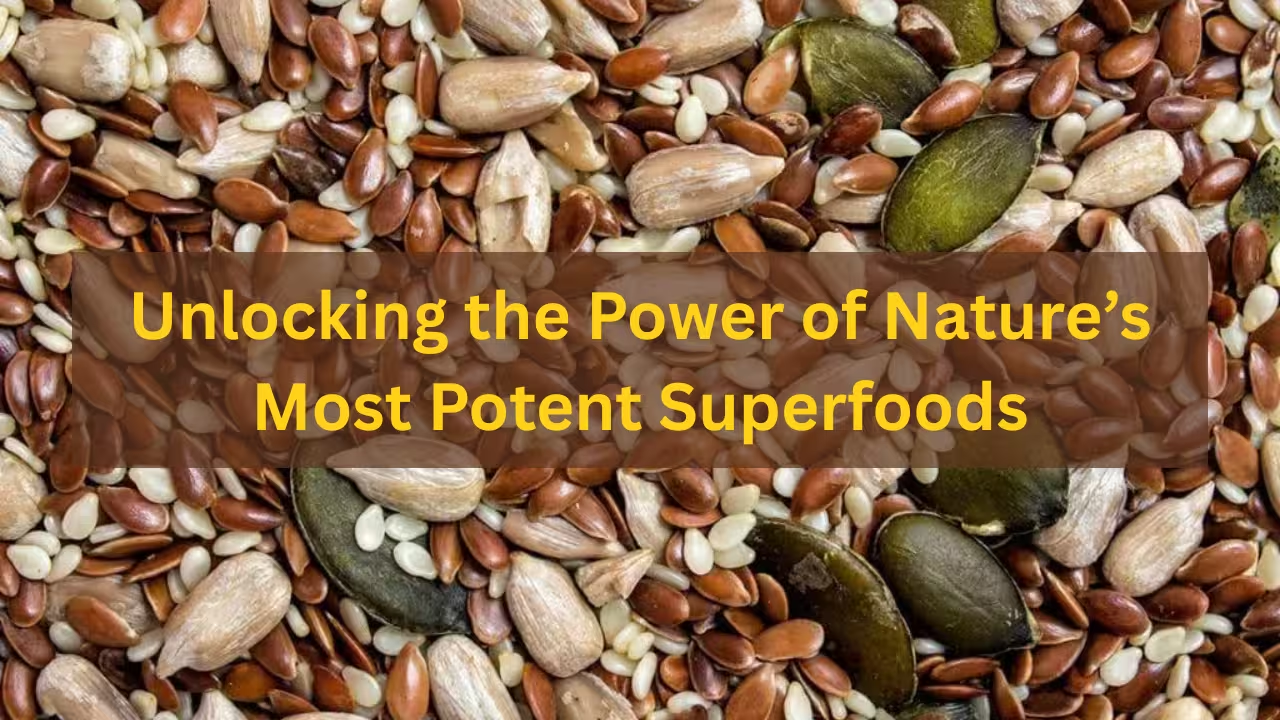Small Seeds, Big Benefits: How Tiny Nutritional Giants Are Transforming Modern Nutrition

In the growing pursuit of natural, functional wellness, nutrient-dense seeds are gaining attention as powerful dietary additions. Once limited to traditional medicine or regional diets, seeds such as chia, flax, basil (sabja), sunflower, pumpkin, hemp, sesame, and watermelon are now trending across global wellness platforms, food products, and health blogs.
Packed with essential nutrients, these super seeds are being recognized for their roles in boosting metabolism, improving digestion, supporting heart health, and even enhancing cognitive function. As more consumers prioritize clean-label, plant-based, and preventive nutrition, seeds are becoming essential components of modern healthy living.
Why Seeds Are Trending
Seeds are small, but nutritionally mighty. They are rich sources of:
-
Plant-based protein
-
Omega-3 and omega-6 fatty acids
-
Antioxidants and anti-inflammatory compounds
-
Fiber for digestive and metabolic health
-
Micronutrients such as magnesium, calcium, zinc, iron, selenium, and B-vitamins
Unlike synthetic supplements, seeds offer a natural, bioavailable form of nutrients that are easy to integrate into everyday meals.
A Comprehensive Look at Trending Super Seeds
1. Chia Seeds
Chia seeds are nutrient-dense and rich in omega-3 fatty acids, dietary fiber, and high-quality protein. They support heart health, aid digestion, regulate blood sugar, and promote satiety.
Use: Soak in water or milk to create chia pudding, or mix into smoothies, yogurts, and baked goods.
2. Basil Seeds (Sabja)
Basil seeds, also known as sabja, are prized in Ayurvedic and traditional medicine for their cooling and digestive properties. They contain fiber, iron, and plant compounds that help relieve bloating and promote gut health.
Use: Soaked in water and added to lemon drinks, herbal infusions, falooda, or smoothies.
3. Sunflower Seeds
Sunflower seeds are packed with vitamin E, healthy fats, selenium, and magnesium. They help reduce inflammation, support cardiovascular health, and promote glowing skin.
Use: Enjoy raw or roasted, add to trail mix or salads, or grind into sunflower seed butter.
4. Pumpkin Seeds (Pepitas)
Pumpkin seeds are high in zinc, magnesium, and antioxidants. They support immunity, improve sleep quality, benefit heart health, and may promote prostate wellness.
Use: Toast lightly and use in soups, granola, baked items, or consume as a healthy snack.
5. Flaxseeds
Flaxseeds are known for their lignan content—plant compounds with antioxidant and hormone-balancing effects. They are also high in omega-3s and fiber, aiding in cholesterol management and digestive regularity.
Use: Consume ground flaxseed in porridge, smoothies, or while baking.
6. Watermelon Seeds
These seeds are rich in plant-based protein, magnesium, and healthy fats. They support muscle repair, bone strength, and energy production.
Use: Roast for snacking, blend into energy bars, or use ground in baking.
7. Hemp Seeds
Hemp seeds are one of the few plant-based sources containing all nine essential amino acids, making them a complete protein. They also offer omega fatty acids that support joint, brain, and skin health.
Use: Sprinkle over cereals, smoothies, or yogurt; mix into salads or protein bars.
8. Sesame Seeds
Rich in calcium, iron, and sesamin (a powerful antioxidant), sesame seeds promote bone health, improve cholesterol levels, and may help regulate blood pressure.
Use: Add to stir-fries, breads, salads, or use as tahini in dips and sauces.
9. Poppy Seeds
Poppy seeds are high in fiber, calcium, and iron. Known for their calming effects, they support digestion and may help improve sleep and bone density.
Use: Common in baking, traditional sweets, or added to chutneys and seasoning mixes.
10. Cumin Seeds
Widely used in cooking, cumin seeds have strong digestive properties and act as a natural detoxifier. They also contain antioxidants that support metabolic health and immune function.
Use: Dry roast for use in Indian curries, spice blends, herbal teas, or lentil dishes.
Functional Benefits of Seed Consumption
These nutrient-rich seeds offer more than just flavor and crunch:
-
Weight management through fiber and protein-induced satiety
-
Heart health via good fats and antioxidants
-
Hormonal balance through lignans and trace minerals
-
Enhanced energy and immunity from B-vitamins, zinc, and magnesium
-
Better digestion due to natural fiber and detoxifying properties
Their natural, plant-based profile makes them ideal for vegans, vegetarians, and those with gluten or dairy intolerances.
How to Incorporate Seeds into Your Diet
You don’t need to overhaul your meals to enjoy the benefits of seeds. Here are a few easy ways to include them:
-
Blend chia, flax, or hemp into smoothies
-
Use basil or sabja seeds in lemon water or detox drinks
-
Add sunflower, sesame, or pumpkin seeds to salads, trail mixes, and breads
-
Incorporate ground melon or flaxseed into flour for baking
-
Try tahini (sesame paste) or sunflower seed butter as spreads
Final Thoughts
Seeds are no longer just garnish—they’re a central feature in the wellness movement. Whether you're aiming to boost your nutrient intake, improve digestion, support hormonal balance, or simply eat cleaner, seeds offer a convenient, cost-effective, and versatile solution.
As the market continues to embrace functional foods and clean-label nutrition, seeds are proving that big health benefits can come in very small packages. Adding them to your daily routine is one of the simplest ways to nourish your body from the inside out.



 210
210

 The BharatBiz
The BharatBiz
 16
16

